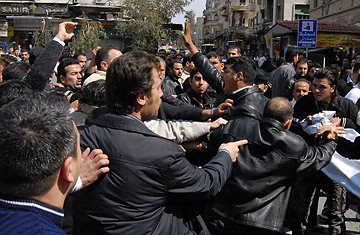
Syrian antigovernment and pro-Assad protesters clash after Friday prayers in Damascus on March 25, 2011
(2 of 2)
"All the people know that lifting the emergency law doesn't mean anything on the ground without resolving all of these issues that are tied to it," Ziadeh says. Nevertheless, lifting the state of emergency imposed by the law will renew many personal freedoms inscribed in Syria's constitution. "Lifting it will give a big boost to the protesters, it will encourage them to continue, even though it doesn't really mean anything different on the ground," Ziadeh says.
In addition, Ziadeh says, the quick concessions may suggest that the regime is struggling to figure out how to stave off further turmoil. "It's a big weakness: they're taking steps back and aren't sure what to do," he says. "There is soft discourse from the regime but on the ground the security forces are shooting protesters with live bullets." Several dissident websites have posted reports of a split between Bashar and his younger brother Maher, who heads the Presidential Guard. That is impossible to verify. What appears more apparent is a fracture between the powerful Vice President Farouk al-Sharaa and the security forces. Sharaa hails from Dara'a, the city in southern Syria that has been the focal point of the unrest. The army beefed up its presence there on Sunday, as well as deploying in the northern port city of Lattakia, which has also seen bloody unrest. But Dara'a has been battered the hardest, with claims of double-digit death tolls reportedly at the hands of security forces.
According to a report in Syria's al-Watan daily last week, the Vice President traveled to Dara'a soon after protests started in order to assure demonstrators that they would not be targeted with live fire by security forces, especially in the vicinity of the town's central al-Omari Mosque. Despite his pledge, they were fired upon. That action by the security forces allegedly infuriated the Vice President, who has maintained an uncharacteristically low profile since.
The regime has also resorted to blaming "foreign hands," an old standby, for the turmoil, parading an Egyptian American on state-run television who claimed that he had been paid by a Colombian to "transmit images and videos about Syria" and that he had recently traveled to Israel, a state Syria remains technically at war with. The country's Grand Mufti, Ahmad Badreddin Hassoun, also suggested foreign "instigation against Syria" emanated from Damascus' anti-Israeli foreign policy and support for militant groups including Hamas in Gaza and Hizballah in Lebanon.
Syrians have been expecting President Assad to address the nation for days. He is likely to announce further reforms, or at the minimum, speak of his openness to them. The Syrian regime, though just as autocratic and brutal as the now overthrown regimes in Tunisia and Egypt, could always boast that its young President, who was trained as a physician, was more attuned to the needs of his people. Even U.S. Secretary of State Hillary Clinton has indicated that Assad has a reformist bent, though she demanded that his regime cease killing its own citizens. She did say, however, that the Syrian leadership is unlikely to receive the same treatment as Libya's Muammar Gaddafi, who also threatened his people with violence. That's one thing that the Syrian President doesn't have to worry about. Now he just has to hope he can say the right things.
